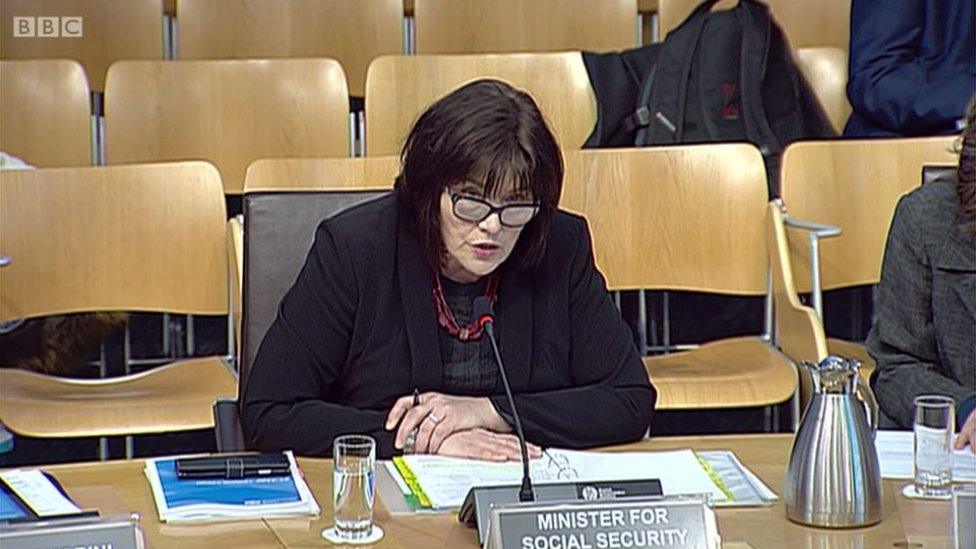Scottish social security system plans at 'critical point'
- Published
- comments

Holyrood is taking on responsibility for a raft of social security powers including disability living allowance
The establishment of Scotland's devolved social security system is at a "critical point", auditors have said.
Holyrood is taking on responsibility for a range of welfare benefits, to be delivered by a new government agency.
A new Audit Scotland report warned that ministers had "not clearly estimated" the cost of putting powers into practice, urging greater transparency.
Scottish government minister Jeane Freeman said she was "confident" that plans for the agency were on track.
MSPs are currently considering legislation, external to set up a Scottish social security agency for the delivery of a range of welfare benefits.
Holyrood is taking on the administration of benefits including disability living allowance, personal independence payments, carer's allowance and winter fuel payments.
The devolution of responsibility for these powers is being staggered, with the system due to be fully operational by 2021.
'Highly complex'
The new Audit Scotland report describes the latest round of devolution as a "large and highly complex programme", with the social security powers a "key part of this".
Auditors said with the goal of delivering the first wave of devolved benefits by summer 2019, the project is now "at a critical point", saying "a significant amount of work is required during 2018 if planned timescales are to be met".
The report said ministers had "taken some important steps to assess its workforce and priorities" - with plans to recruit up to 1,500 staff for the agency, based in Dundee and Glasgow - but warned that "it will be challenging to recruit and deploy all the necessary people and skills in time".

The report also raises concerns about costs.
It notes: "The Scottish government has not estimated the total cost of implementation, or the extent to which this will exceed the UK government's agreed contribution. The excess will require funding from the wider Scottish budget.
"Greater transparency and a better understanding of overall implementation costs are needed to support financial planning and decision-making".
Auditor General Caroline Gardner said "good early progress" had been made, but repeated that plans were at a "critical point".
She said: "More detailed workforce analysis and a much more transparent picture around overall costs are needed to ensure the right people and infrastructure are in place in time."
'Robust plans'
Ms Freeman said the main concern for the Scottish government was knowing that the Department of Work and Pensions could "match our pace" in the ongoing work.
She said: "We are confident that we are on track against our plans. However, as highlighted by Audit Scotland, it is crucial that we have clarity and confirmation - and that we understand what the DWP's detailed plans are.
"We cannot deliver this in isolation and we need to know that the DWP is able to match our pace.
"We recognise the significant amount of work still to be done as we continue the programme to transfer powers, bring forward legislation and build the infrastructure we need.
"We are confident that we have robust plans in place and a full understanding of our overarching costs and are on track to deliver benefits to Scotland's people."

Jeane Freeman insisted plans were on track
Opposition parties pointed to the concerns over costs as evidence that the government "simply hasn't done its homework".
Scottish Conservative MSP Adam Tomkins said it was "incredible" that the government "hasn't at least attempted to work out how much this is going to cost".
He said: "The Nationalists are about to learn not only how difficult it is to achieve a fair welfare system that's affordable and sustainable, but how complex it is to get it up and running."
Labour's Mark Griffin said it appeared ministers had not "adequately budgeted" for how much implementation would cost.
He said: "Our public services are full of examples of the SNP government not being able to workforce plan adequately - that must not be replicated for Scotland's new social security powers."
Meanwhile, Lib Dem social security spokeswoman Caron Lindsay said there was a "mammoth task" ahead, warning that a "golden opportunity to tackle poverty and inequality can't be squandered".
- Published19 January 2018

- Published19 December 2017

- Published18 September 2017
